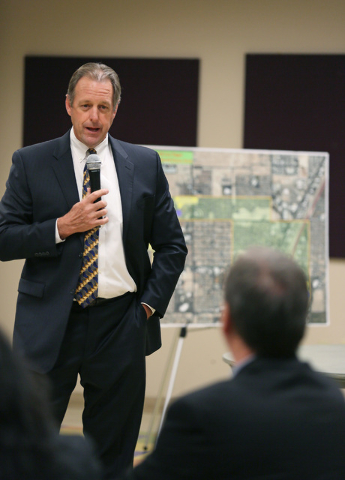Police Chief: North Las Vegas mayor got special treatment in child porn investigation
North Las Vegas Mayor John Lee received special treatment in a brief investigation of suspected child pornography found on his iPad, the city’s former chief of police told the Review-Journal.
Former Chief Joseph Chronister, who retired Thursday, said that while one of his detectives investigated, he now wishes his department had done more and had sought help from an outside agency.
North Las Vegas police got the case after the mayor asked the department for help removing what he believed to be child pornography from his personal iPad. A detective helped out but didn’t check any of the mayor’s other electronic devices or press Lee on why his story didn’t make sense in light of evidence found, a police report filed last year shows.
Asked if anyone else would have been treated the same way, the chief said the short answer is no.
“We’re talking about the mayor of North Las Vegas,” Chronister said. “He is a person of authority. He is a person of power. He absolutely has the ability to control certain aspects of our department.”
That includes who the chief of police is. Chronister said that Lee, who took office in July 2013, told him last December that he had to leave the department by June.
A North Las Vegas police officer since 1989, Chronister said that he and Lee have clashing personalities and that Lee wants “bobbleheads” in government who never disagree.
Reached for comment Thursday, Lee said he wasn’t investigated for possession of child pornography — he was a victim. He said he contacted police because he was worried children were being harmed and he felt he should give them his iPad in case it could stop a bad guy.
But Lee’s version of the events doesn’t match the police report or Chronister’s account of what happened.
PORNOGRAPHY FOUND
According to a report filed by Detective Mark Hoyt, another officer was at City Hall when the mayor approached him on Oct. 9.
Chronister said he was told that Lee “grabbed” the officer and said “he had an issue with kiddie porn popping up on his computer.”
A few days later, a detective who handles these types of cases called Lee. According to his report, Lee told him that someone sent him an email and that several images he thought were child pornography popped up and he wanted them gone.
The detective told the mayor if he found illegal content, he could take legal action and would notify the National Center for Missing and Exploited Children, according to the report. The mayor told him to go ahead and pick up his iPad.
The investigation lasted just one day, Oct. 20.
In his report, the detective said he found no emails having to do with pornography of any kind but did find links to three pornographic websites in the iPad’s browser history. Two of the sites were not illegal, the detective determined, but the third showed pornography organized by the country where the images originated. He said the site looked illegal.
“I did locate several possible photos that could be considered child pornography, but since they were in a different country, I could not verify the age of the people pictured,” the detective wrote.
That sentence confused Joseph Dooley, a retired FBI agent who previously ran Connecticut’s computer crimes task force. The Review-Journal contacted Dooley for his take as an expert in the field.
“If he thinks it’s child porn, it’s child porn. It doesn’t matter what country it’s in,” Dooley said. “That sentence makes no sense to me.”
He also questioned why the department waited so long to seize the iPad after the mayor told them it might have illegal content. It’s not unusual to wait to investigate a device, but it’s not proper to delay seizing it, he said.
“If you suspect you have child porn on the device, that’s like having a kilo of cocaine sitting on your coffee table,” he said.
Hoyt declined comment on the case, but in his report he said he plugged the iPad into an FBI-owned computer that downloads everything but could not find the email Lee described.
Chronister said his understanding, based on conversations with the detective, is that the mayor’s explanation about pornography associated with an email couldn’t have happened as the mayor described.
Finding nothing he could prove illegal on the iPad, the detective took it to an Apple Store and had it wiped clean the next day, according to the report. In his report, the detective said an Apple employee told him that a deleted email would no longer be on the device.
Hoyt returned the wiped iPad to Lee’s office and closed the investigation.
“Why wouldn’t the mayor go wipe his own computer?” Dooley asked. “That’s bizarre.”
Chronister said it’s “a good question” whether his department should have looked further into the technical aspects of the iPad or tried to determine if there was probable cause to check Lee’s other electronic devices for child pornography.
Police can’t just go on fishing expeditions and start seizing other computers, he said, adding that he doesn’t know if the detective had enough to go deeper.
As to whether the department wiping the iPad was unusual, Chronister said he didn’t think so and that officers will often go above and beyond.
Dooley said that still seemed strange.
“But there was no crime, what crime are they wiping evidence of?” Dooley asked.
“Because it’s the mayor of the city, higher stature and not some guy working the local Wal-Mart, there’s politics at play. Maybe (the detective’s) supervisors should have been more involved because the mayor was involved,” he said.
“I think it was closed prematurely, based on what the detective himself said in his own words. I would have gone to consult with the DA’s office, ‘Hey am I doing the right thing here, do you think we have probable cause?’ ”
One argument in favor of closing the case might have been Lee’s volunteering the iPad to police, something that doesn’t usually happen, Dooley said.
“I absolutely believe if this detective would have felt that there were potentially other victims or more material that he definitely would have went in that direction after it,” Chronister said.
“You know, we serve a difficult role in law enforcement,” Chronister said. “We have elected officials that we depend upon to provide to us resources, funding and things like that.”
“If there should have been a more thorough and in-depth investigation then I guess that’s my fault, maybe, for not telling the detective to go on,” Chronister said. “I’m not an expert in this arena at all, and I have 100 percent confidence in the work that our detectives do. I absolutely do.”
Lee, meanwhile, said he never approached a detective at City Hall, and he doesn’t know why the report and the police chief say he did. He said he had his assistant call the police.
He also said he doesn’t know why police couldn’t find the email. He said he didn’t delete it because he wanted police to see it so they could find the sender.
Lee said all he knew is that he got his iPad back.
“As far as I know there were people who were doing evil to children,” Lee said. “I don’t have anything to do with that sin.”
ODD REQUESTS
Chronister said Lee’s iPad request wasn’t the only time he has sought unusual help from police. Just a week earlier, he called the chief, asking for help “debugging a phone.”
“Initially what my thought was: Wow. Debugging,” Chronister said. “The first thing that came to mind was ‘Am I going to have to reach out to another agency?’ That’s not something that we do. This is Watergate crap.”
The voice mail is quick, cheerful and ends with the Lee saying, “Thanks, bud. Buh-bye!”
Chronister said he called Lee back, and the mayor’s explanation was confusing — something to do with a friend who needed help with their child. Chronister said he connected Lee with an officer who might have access to information about debugging and doesn’t know what happened after that.
Chronister said he didn’t know what to make of the voice mail, which he played for the Review-Journal.
Lee said that he didn’t remember asking the chief for advice on how to debug a phone and that “debugging” isn’t even something that would enter his mind or a question he would need to ask.
Chronister said he now wonders whether the call about debugging and the issue with the iPad were somehow related.
“It was much later when I thought back (about a connection),” he said. “But he said phone. He was clear. Debugging a phone.
“Maybe it’s just me being a little hypersensitive, trying to put the two together and they truly don’t go together. But both — relative close time frame, both of them were interesting requests of our department.”
In hindsight, Chronister said, he should have had a round-table discussion with the detective and his supervisors and perhaps brought in an outside agency, he said.
Then no one would have questions, himself included.
Contact Bethany Barnes at bbarnes@reviewjournal.com or 702-477-3861. Find her on Twitter: @betsbarnes

























